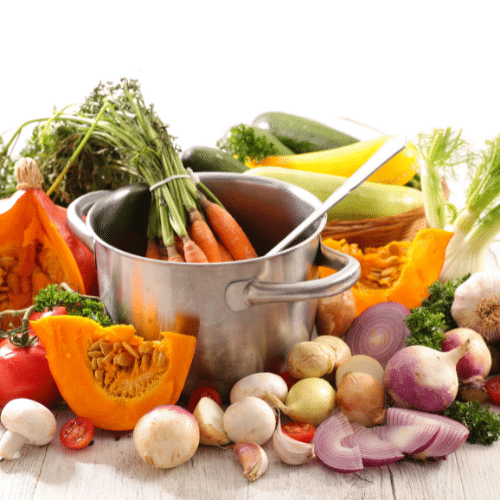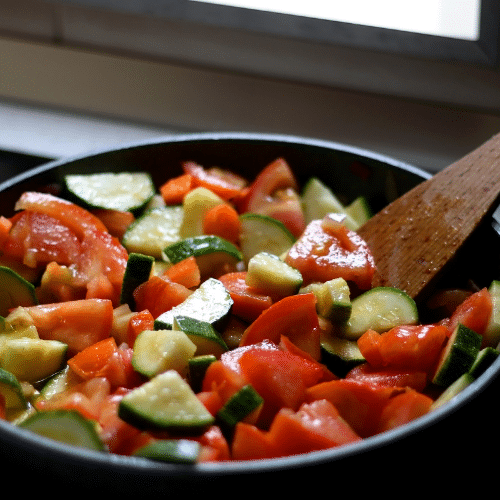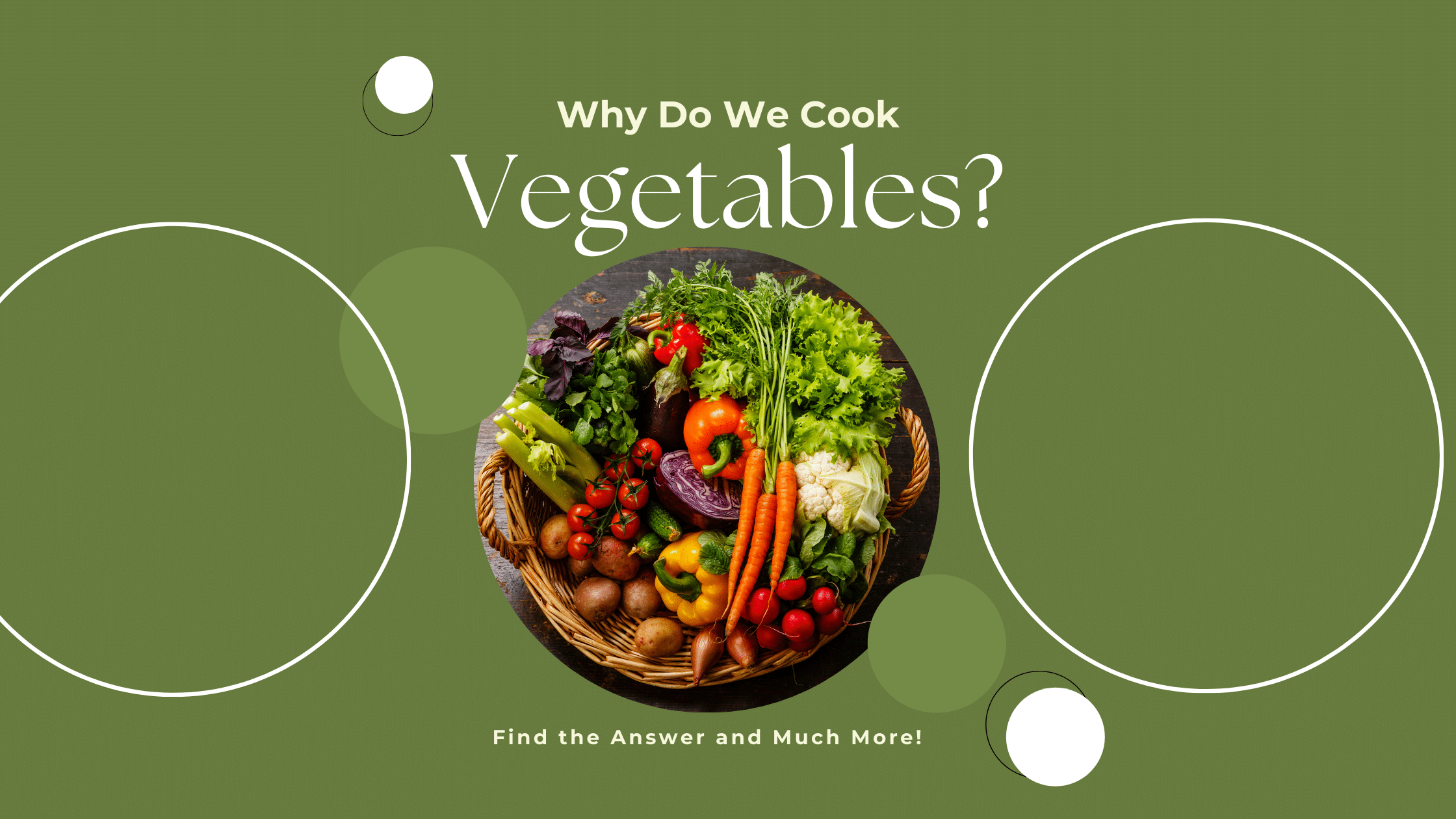We have all been told to eat our cooked vegetables from the time we were born to our present day.
Our mothers always told us that cooked vegetables taste good and help build strong bodies that can function well in our everyday lives.
So in this article, we would like to help you understand why do we cook vegetables and help you become a better cook.
Let’s get started!
Why Do We Cook Vegetables?
Increased consumption of raw and cooked veggies may benefit your health by lowering your risk of heart disease, assisting in weight maintenance, and decreasing blood pressure and cholesterol levels.
While some elements in vegetables, such as water-soluble vitamins and enzymes, may be reduced during cooking, others may be enhanced.
Your health objectives, the nutrients involved, and the cooking methods utilized all influence whether or not you should prepare your veggies.
Cooking vegetables breaks down the plant’s cell walls while releasing the nutrients that are tied to these cell walls.
Cooked vegetables are a great source of antioxidants, including lutein, beta-carotene, and lycopene, which are not as beneficial to our bodies when used in raw form.
Cooked vegetables also have more minerals and are best for combatting chronic diseases, like heart disease.

Ways to Cook Vegetables
Sauteeing vegetables involve cooking with a bit of oil over a highly heated stove. Other ways to cook vegetables include:
Boiling
Baking
Frying
Grilling
Pureeing, just to name a few.
Reasons Why Do We Cook Vegetables
1.
Release of Nutrients – One of the most important reasons we cook vegetables is because the heat releases nutrients and minerals inside the vegetables to greater levels when they are inside our bodies.
For examples of this argument, let us look at five vegetables that include spinach, mushroom, carrots, asparagus, and tomatoes.
Spinach is an excellent source of nutrients that include calcium and iron.
However, eating spinach raw versus cooked is a decision that we contemplate daily.
Our bodies will absorb twice the amount of calcium and iron when eating cooked spinach.
Mushrooms are a great source of nutrients when cooked. A cup of white mushrooms that have been cooked offers our bodies the zinc booster, heart-healthy niacin, two times as much muscle-building potassium, and bone-strengthening magnesium in cooked form compared to raw mushrooms.
We know that carrots are good for our eyesight and other essential organs in our bodies. Carrots have the cancer-fighting ingredient of carotenoids, which is why their orange color. Carotenoids are more active and better for our bodies after heating and cooking.
Asparagus offers nutrients and vitamins for our bodies when heated and cooked. Asparagus gives our bodies iron, potassium, vitamin C, vitamin B, magnesium, calcium, vitamin B-6, vitamin D, vitamin A, and sodium.
The International Journal of Food, Science & Technology found that cooking asparagus stalks raise the levels of nutrients and vitamins and the cancer-fighting abilities in our bodies.
Tomatoes that are baked, fried, or pureed for spaghetti sauce have been shown to be healthier for our bodies. The heating of tomatoes releases the phytochemical lycopene, which is an excellent fighter against heart disease and cancer.
2.
Digestability – as previously stated above, the primary purpose we eat is to extract the essential nutrients that various foods provide in order for our bodies to operate effectively.
This is accomplished by digestion, which breaks down meals into a form that can be easily absorbed by the body. However, many of the nutrients in meals are not readily available prior to cooking and hence are difficult for the body to digest.
3.
Safety – Another reason for cooking vegetables is that cooking kills germs or toxins that may be hidden in the raw form of each vegetable.
The boiling or heat that comes with cooking will help destroy any bacteria on raw vegetables.
The vegetables must be in the heat long enough to kill pathogens and viruses.
Experts recommend cooking or reheating vegetables at 170 degrees F (75 degrees C) to kill any bacteria on raw vegetables effectively.
Properly cooking vegetable aids in weight loss, are low in calories, and contain water, which helps us release toxins in our bodies.
Why is it Important to Cook Vegetables Correctly?
Overcooking vegetables is one way to destroy the natural nutrients and vitamins from the vegetable in raw form.
While properly cooking vegetables can release these nutrients and vitamins at a higher level for our bodies, overcooking will take away our bodies’ ability to metabolize vegetables where our bodies can use them.

Benefits of Cooked Vegetables
Cooking vegetables causes the cell walls to become less stiff, making it simpler to absorb nutrients and digest food.
Cooked carrots, for example, have more beta carotene, an antioxidant that may be converted to vitamin A and promotes bone, eye, and reproductive health when compared to raw carrots.
When tomatoes are cooked, the quantity of lycopene, a carotenoid linked to a lower risk of heart disease and cancer, increases.
Benefits of Raw Vegetables
Vegetables’ nutritional levels are depleted when they are cooked at high temperatures or in water.
During these cooking procedures, water-soluble vitamins including vitamin C and B vitamins are frequently lost. Potassium, phosphorus, calcium, magnesium, iron, and zinc concentrations may be lowered by up to 70%.
When broccoli is cooked, the sulfur-containing vitamin glucosinolate, which may help prevent cancer, is also reduced.
The quantity of nutrients lost during cooking is determined by a variety of factors, including food preparation, cooking methods, and cooking time.
Here’s a video on why do we cook vegetables and a comparison of raw vs cooked vegetables.
Statistics and Facts About Cooked Vegetables
There are many interesting statistics and facts about cooked vegetables around the world.
Vegetables add to a balanced diet and more ways to combat common and chronic diseases in our bodies.
Studies show that the millennial population rarely leads an interest in cooking, whether vegetables or anything else.
Vegetables have become a staple in some parts of the world, with over 1 billion barrels of vegetables in Asia alone being cooked and eaten.
Statistics also show that only 10% of people eat vegetables around the world, which may be the reason for many unhealthy populations. Facts also show that women eat green leafy vegetables at a higher percentage than men.
Spain is found to be the country that eats the most cooked vegetables, with most citizens eating some vegetables daily.
The most popular cooked vegetable is tomato. It may be because of the many ways a tomato can be cooked, including baked, fried, or pureed as a part of a spaghetti sauce.
Sauteeing vegetables is the best way to cook vegetables.
How to Avoid Nutritional Loss When Cooking Vegetables
To avoid nutritional loss in vegetables:
Choose cooking methods that decrease the amount of time that vegetables are exposed to heat.
Cut down on cooking time, steam, and microwave vegetables.
Refrigerate veggies and buy only as much as you’ll need in the next several days.
Choose vegetables that are local and in season.
Avoid Overcooking Your Vegetables
Eating too much overcooked, microwaved, and processed foods causes a slew of health problems. Cooking has the potential to disrupt food’s natural structure, stripping it of its fundamental nutritional worth.
Other Cooking Techniques for Getting the Most Nutritious Vegetables
Salads
Use more raw, nutrient-dense veggies in your recipes. If you’re tired of the same old green salad, consider adding fresh veggies like broccoli, kale, or onion. Clean them completely before tossing them in olive oil for a tasty side dish.
Smoothies
Raw veggies like spinach or kale may simply be added to a smoothie. Make use of any leftover roasted vegetables (provided they were only seasoned with salt & pepper). The mild-tasting veggies will be completely undetectable!
Sauces
Save the water if you want cooked veggies. The water will absorb nutrients like beta carotene, which you can use to make a sauce for your meal or store for later use in soups and gravies.
The Last Bite
These are some need-to-know details about why we cook vegetables, why we cook vegetables, and why it is essential to cook vegetables properly?
It seems that mama and grandma were correct in telling us that cooked vegetables make our bodies stronger and help our bodies to function better.
We hope that you learned more about why do we cook vegetables and the importance of eating our vegetables in cooked form.
The cooked form destroys bacteria from the raw plant, increases the levels of nutrients and vitamins, and aids in weight loss.
Becoming the best cook means delivering meals to your family to help them grow and strengthen them.
This means adding cooked vegetables to your menu for added value to your family and you.
Are you ready to add cooked vegetables to your menu and increase your skill levels in cooking healthier foods?


